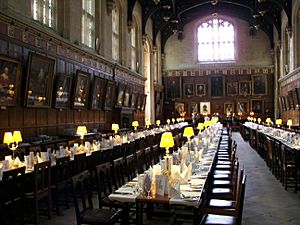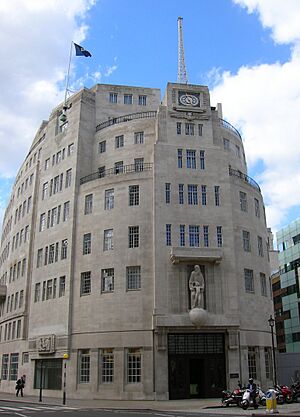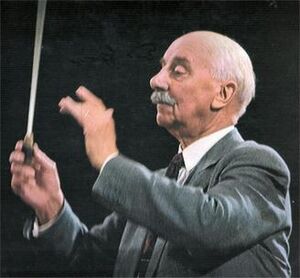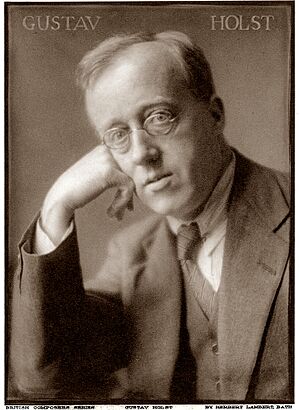Adrian Boult facts for kids
Sir Adrian Cedric Boult (born April 8, 1889 – died February 22, 1983) was a very important English conductor. He grew up in a wealthy family and studied music in England and Germany. Early in his career, he conducted for the Royal Opera House and a famous ballet company in London.
His first big job was leading the City of Birmingham Orchestra in 1924. In 1930, the British Broadcasting Corporation made him their music director. He then created the famous BBC Symphony Orchestra and became its main conductor. This orchestra became one of the best in Britain.
After leaving the BBC in 1950 (because he reached retirement age), Boult became the chief conductor of the London Philharmonic Orchestra (LPO). He helped this orchestra become strong again. He retired from that role in 1957 but stayed on as its president. He continued to conduct the LPO in concerts and recordings until 1978. This period was often called his "Indian summer" because he had so much success.
Boult was especially known for supporting British music. He conducted the very first performance of his friend Gustav Holst's famous work, The Planets. He also introduced new music by other British composers like Elgar, Vaughan Williams, and Walton. During his time at the BBC, he also brought works by international composers like Bartók and Stravinsky to British audiences. Sir Adrian was a humble man who didn't like being in the spotlight. He enjoyed working in the recording studio as much as performing live. His recordings, especially for EMI, are still loved today. He also inspired many younger conductors, such as Sir Colin Davis.
Contents
Sir Adrian Boult: A Great Conductor
Early Life and Musical Start

Adrian Boult was born in Chester, England, on April 8, 1889. His father was a successful businessman and a Justice of the Peace. The family loved music, and Adrian went to many concerts from a young age. He heard famous conductors like Hans Richter and Sir Henry Wood.
He went to Westminster School in London and later studied at Christ Church college at Oxford. He first studied history but then switched to music. There, he became good friends with the composer Ralph Vaughan Williams.
In 1909, Boult gave a talk about how to perform music. He said that a perfect performance should follow the composer's wishes, be clear and balanced, and seem effortless. These ideas guided him throughout his long career. After Oxford, he continued his music studies in Leipzig, Germany, where he learned from the famous conductor Arthur Nikisch. Boult admired Nikisch's precise way of conducting with his baton.
In 1913, Boult joined the Royal Opera House in London. He helped with the first British performance of Wagner's opera Parsifal.
First Conducting Jobs and Famous Premieres
Adrian Boult made his first professional conducting appearance on February 27, 1914. During World War I, he was medically unable to serve in combat. Instead, he organized and conducted concerts to help musicians and bring music to more people.
In 1918, Boult conducted the London Symphony Orchestra in concerts featuring new British music. His most famous premiere from this time was Gustav Holst's The Planets. He conducted the first performance on September 29, 1918. Holst was so grateful that he wrote on the score, "This copy is the property of Adrian Boult who first caused The Planets to shine in public."
Boult also helped bring Edward Elgar's Second Symphony back into the spotlight. Elgar wrote to Boult, "I feel that my reputation in the future is safe in your hands." After the war, Boult also worked as the music director for Sergei Diaghilev's ballet company. He had to quickly learn many complex ballet scores like Petrushka and The Firebird. From 1919 to 1930, he also started the first conducting class in England at the Royal College of Music.
Leading the BBC Symphony Orchestra

In 1930, Boult became the director of music at the BBC. He helped create the new BBC Symphony Orchestra, hiring 114 musicians. The orchestra's first concert was on October 22, 1930, conducted by Boult. Critics loved the new orchestra, calling its playing "superb" and "magnificent." Boult became the chief conductor and director of music at the same time.
During the 1930s, the BBC Symphony Orchestra became famous for its excellent playing. Boult made sure to perform a wide variety of music, including new and unfamiliar works. He introduced many important pieces to Britain, such as Alban Berg's opera Wozzeck and Bartók's Concerto for Two Pianos. He also invited famous international conductors like Richard Strauss and Arturo Toscanini to conduct the orchestra. Toscanini, considered the world's best conductor at the time, said the BBC orchestra was the finest he had ever led.
Boult also conducted internationally, appearing with orchestras in Vienna, Boston, and New York. He led the BBC Symphony Orchestra on successful tours in Europe. In 1937, he conducted the orchestra at Westminster Abbey for the coronation of King George VI.
During World War II, the BBC Symphony Orchestra moved out of London to avoid bombings. Boult worked hard to keep the orchestra's quality high, even as many players left for the war. In 1942, he stepped down as the BBC's director of music but remained the chief conductor. After the war, he helped restore the orchestra to its former glory. He conducted the first broadcast on the new BBC Third Programme in 1946.
However, in 1950, Boult was forced to retire from the BBC because he reached the age of 60. This was despite an earlier promise that he would be exempt from this rule.
Rebuilding the London Philharmonic
After leaving the BBC, Boult was offered the job of principal conductor for the London Philharmonic Orchestra (LPO). This orchestra had struggled financially since the war. Boult took on the challenge in June 1950 and worked hard to rebuild it. He even used his own money to help the orchestra in its early years. The LPO had to play many concerts to earn money, much more than other orchestras.
Boult also started making many commercial recordings with the LPO. Their first recordings included Elgar's Falstaff and Beethoven's First Symphony. Critics praised their work. In 1952, the LPO signed a good recording contract with Decca Records.
In 1953, Boult again conducted for a royal event, leading an orchestra at the coronation of Elizabeth II. He conducted new pieces by Arthur Bliss and William Walton. In 1956, Boult and the LPO toured Russia, performing in Moscow and Leningrad. Despite his dislike of flying, he felt he had to go to lead the tour.
After the Russian tour, Boult decided to step down as the LPO's principal conductor. He remained closely involved with the orchestra as its president and a guest conductor until his retirement.
Later Years and Legacy
In his later years, especially after 1965, Boult's career had a wonderful "Indian Summer." He made many more recordings, especially for EMI. He re-recorded much of his favorite music in stereo. After the death of his colleague Sir John Barbirolli in 1970, Boult was seen as the last of a great generation of conductors, a direct link to composers like Elgar and Vaughan Williams.
Boult loved recording and preferred it to live concerts. His recording career spanned from the early days of acoustic recording to the start of the digital era. His last recording, completed in December 1978, was of music by Hubert Parry. He formally retired from conducting in 1981 and passed away in London in 1983 at the age of 93.
Boult's Conducting Style
Boult was known for his clear and precise conducting. He learned an "immaculate stick technique" from Nikisch. He disliked conductors who made big, showy movements. He believed the music should speak for itself, without the conductor drawing too much attention.
He was very particular about orchestral balance, making sure every important part of the music could be heard clearly. Musicians who worked with him said he would insist that quieter instruments play softly so that soloists or other important parts could shine through.
Boult also taught conducting. He started the first conducting class in Britain at the Royal College of Music. He also mentored many young conductors, including Colin Davis and Vernon Handley, who became famous in their own right.
Honours and Memorials
Boult received many honors during his life. He was made a Knight Bachelor in 1937, which means he was called "Sir." In 1969, he became a Companion of Honour (CH), a special award for outstanding service. He also received the gold medal of the Royal Philharmonic Society in 1944.
Many universities and music schools gave him honorary degrees. A small memorial stone to Boult was placed in Westminster Abbey in 1984. His old school, Westminster, has a music center named after him. The Royal Birmingham Conservatoire also had the Adrian Boult Hall, a concert venue named in his honor, which was used for many years. In 2013, Gramophone magazine added Boult to its Hall of Fame for his lasting impact on classical music recordings.
Recordings
Boult made many recordings throughout his career. He was comfortable in the recording studio and preferred it to live performances. His recordings cover a long period, from early acoustic recordings to experimental digital sound.
He recorded almost all of the major works by British composers like Elgar and Vaughan Williams. He recorded all nine of Vaughan Williams's symphonies, some with the composer present. Vaughan Williams trusted Boult's interpretation of his music completely.
Boult also recorded works by Holst, Ireland, Parry, and Walton. While he was known for introducing modern European composers in his concerts, record companies were often cautious about recording him in this type of music. However, his recordings of Brahms's symphonies and Schubert's Great C major Symphony are still highly regarded. Late in his career, he made acclaimed recordings of excerpts from Wagner's operas. His recordings show the wide range of music he conducted, even if some of his more adventurous concert programs weren't captured on disc.
See also
 In Spanish: Adrian Boult para niños
In Spanish: Adrian Boult para niños
 | Laphonza Butler |
 | Daisy Bates |
 | Elizabeth Piper Ensley |



